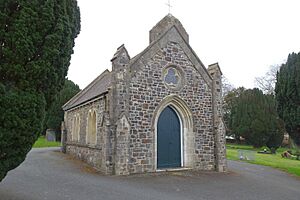Carmarthen Cemetery Chapel facts for kids
Quick facts for kids Carmarthen Cemetery Chapel |
|
|---|---|
 |
|
| Location | 6, Russell Terrace, Carmarthen |
| Country | Wales, United Kingdom |
| Denomination | Cemetery chapel |
| History | |
| Founded | 1855 |
| Architecture | |
| Heritage designation | Grade II |
| Designated | 19 May 1981 |
| Architectural type | Chapel |
| Style | Mid 19th century |
The Carmarthen Cemetery Chapel is a special old building in Carmarthen, Wales. It is a chapel located within a cemetery. This historic building was built in 1855. You can find it at 6, Russell Terrace, in the town of Carmarthen.
History of the Chapel
In 1853, people decided to build two chapels for the cemetery in Russell Terrace. One chapel was for people who followed the Anglican faith. The other was for Nonconformist Christians. These were different groups of Christians.
Building the Chapels
Several builders offered to construct the chapels. James Wilson, R.K. Penson, and W.W. Jenkins all submitted plans. At first, Penson's plan was chosen. However, after more thought, Jenkins received the job. He built both chapels. He also built the walls and entrance gates for the cemetery.
Each chapel was made from rough stone. It had smooth stone details and slate roofs. The inside of each chapel was simple. In 1856, Bishop Thirlwall officially opened the cemetery. After this, the churchyard of St Peter's Church stopped accepting new burials.
Changes Over Time
Since they were built, some things have changed. One of the two chapels has been taken down. The original entrance gates are also no longer there.
Why the Chapel is Special
The Carmarthen Cemetery Chapel is considered a very important building. On May 19, 1981, it was given a special status. It became a Grade II listed building. This means it is protected because of its historical importance. It is a great example of a mid-19th-century cemetery chapel. It was built in the Gothic style, which was popular at the time.

